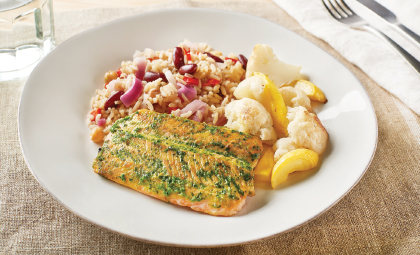Could the quality of life of patients with advanced-stage cancer be improved by personal delivery of nutritious, medically tailored meals? Researchers at the New York University School of Medicine Perlmutter Cancer Center think so, and they have set out to prove it in a randomized clinical trial.

We believe that nutrition can be an effective arm of palliative oncology.— Omar Ishaq, MD
Tweet this quote
“This is the first randomized controlled trial of this sort of intervention, for the improvement of quality of life. Essentially, it’s a trial to assess whether food can, almost literally, be medicine,” said the study’s lead researcher Omar Ishaq, MD, of NYU School of Medicine’s Department of Radiation Oncology, who described the project at the 2016 Palliative Care in Oncology Symposium.1 “We believe that nutrition can be an effective arm of palliative oncology.”
The researchers have enlisted the services of God’s Love We Deliver (www.glwd.org), a large nonprofit meal-delivery service that services residents of the New York metropolitan area with chronic illnesses. Patients can be referred to God’s Love We Deliver by physicians and then are assessed by registered dieticians. The study aims to enroll 180 patients newly diagnosed with metastatic lung or noncolorectal gastrointestinal cancer. Patients must be capable of oral alimentation.

Vegetarian tofu lasagna. Home-delivered, medically tailored meals are distinct from those provided by traditional home-delivered meal programs in that they are prescribed by a nutritionist and are modified for a patient’s symptoms, comorbidities, and health needs.
Enrollees will receive standard of care with or without the home-delivered, medically tailored meal program (three meals per day) until death or patient refusal. The main endpoint is improvement in quality of life by the Functional Assessment of Cancer Therapy–General (FACT-G) overall score at 12 weeks. A change of 5 to 7 points indicates a clinically significant impact.
Other validated instruments will also be used to determine the effect of the program on nutritional status, weight, and mood. Tools will assess socioeconomic measures, including food security, financial toxicity, health-care utilization, and cost-effectiveness of medical resources.
Nutrition as Quality-of-Life Measure
“Non–tumor-directed supportive care interventions in metastatic cancer patients have been shown, in randomized controlled trials,2 to improve quality of life and even survival. Improvement in measures for quality of life span many fields, including nutrition. In our project, we intend to focus on a nutritional strategy to improve the quality of life for metastatic cancer patients,” Dr. Ishaq said.
He noted that up to 85% of patients with cancer are malnourished, especially those with lung and gastrointestinal tumors and patients with advanced disease. This can impair their response to chemotherapy, prolong their hospitalizations, impact their quality of life, and shorten their lives. Home-delivered meals are a means of improving their nutrition and well-being, but they have not been formally studied as an intervention in cancer patients.
Medically Tailored Diets
These home-delivered, medically tailored meals are distinct from those provided by traditional home-delivered meal programs in that they are prescribed by a nutritionist and are modified for a patient’s symptoms, comorbidities, and health needs. For example, patients with dysphagia or odynophagia may receive pureed and minced foods, with a mashed potato–like consistency, and those with mucositis may receive bland foods—for example, any vegetable but tomato and fruits that are not citrus.

Salmon dinner. God’s Love We Deliver prepares more than 1.4 million medically tailored meals and delivers them to almost 6,000 patients every year.
Three meals tailored to the patient’s individual needs are delivered. If requested, family members can also be served.
While no data are yet available on the patients enrolling in the randomized trial, a previous survey found that 211 patients with cancer were highly satisfied with this service. They reported that, compared to the time before they received these meals:
- 87% were able to eat more than half of their meals
- 91% were able to live more independently
- 89% were able to eat more nutritiously
- 70% reported less fatigue
- 61% said the meals met their cultural needs
About God’s Love We Deliver
Since its founding 30 years ago in response to the AIDS crisis, God’s Love We Deliver has grown into one of the largest food nonprofits in New York, with a 48,000 square-foot facility in Manhattan and a 10,000 square-foot state-of-the-art kitchen. God’s Love We Deliver prepares more than 1.4 million medically tailored meals and delivers them to almost 6,000 patients every year. Over 270,000 of these meals are provided to debilitated cancer patients, of which 33% have lung and gastrointestinal cancers.
Medically Tailored, Home-Delivered Meals
- New York University School of Medicine is partnering with God’s Love We Deliver, a nonprofit home-delivered meal program in New York, to provide nutritious, personalized meals to patients with cancer.
- The impact of this intervention on quality of life, nutrition, and even cost-effectiveness is being evaluated in a randomized controlled clinical trial.
- A survey of patients with cancer already receiving these meals shows increases in independence and food intake and reductions in fatigue.
Cost-Effectiveness of Good Nutrition
Dr. Ishaq suggested that medically tailored, home-delivered meals could actually prove to be a cost-effective intervention, and he hopes the study proves that. He noted that gemcitabine was approved for pancreatic cancer on the basis of a significant improvement in quality of life. “This is way cheaper than a cancer drug,” he said.
“We have a lot of data showing that malnourished patients are admitted to the hospital more often,” he continued. “One day of hospitalization costs the same as 6 months of these meals. We are approving multibillion-dollar chemotherapy drugs, when we could literally be giving better food to our patients.” ■
Disclosure: Dr. Ishaq reported no potential conflicts of interest.
References

